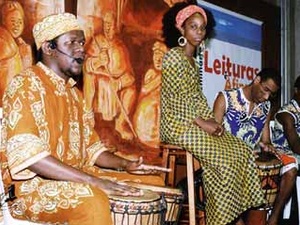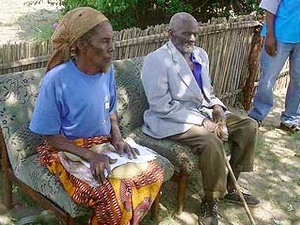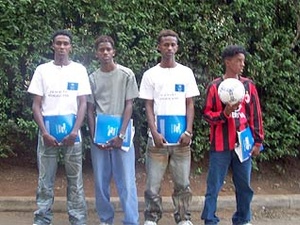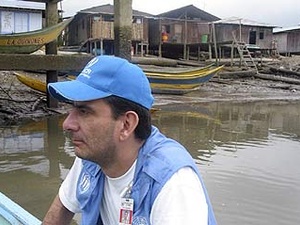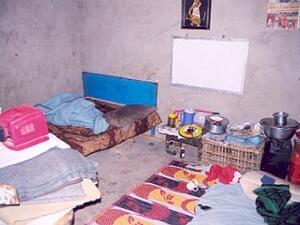Americans are our friends now
Americans are our friends now
Conference poster.
"Americans are our friends. We know that now because they're fighting against the Taliban," Mohammed said proudly in Russian.
He is well groomed, intelligent and young. Eyeing his children playing in the park on a clear autumn day, he recalled the years of living in fear in Mazar-e-Sharif, a northern city of Afghanistan.
"The Taliban are not human beings, they're animals. We've had many wars in Afghanistan, but never did we see small children massacred in the streets," he said.
Mohammed is a refugee, recognized by UNHCR's Office in Belgrade. Yugoslavia already hosts more than 626,000 refugees and displaced persons from wars in Bosnia and Herzegovina, Croatia and Kosovo, but it has yet to implement an asylum law. For refugees arriving from countries outside the region, this means that resettlement to third countries is their only possibility for a new life.
When the Taliban occupied Mazar-e-Sharif in 1998, Mohammed was ordered to close his rental video store. Replicating life in pictures was strictly prohibited under the Taliban rule.
When Mohammed refused, the Taliban destroyed his shop and threw him into jail where he spent the next year and a half. "My father asked a friend and bought my freedom. But this friend was killed shortly after I was released," Mohammed said.
Mohammed hid for a year in neighbours' houses and home-made bomb shelter. "They used to beat up my father," he recalled. "I heard him say to the Taliban: 'ok, take this one (Mohammed's invalid brother) instead and leave us alone! Fire a rocket at our house and finish it!'"
He was eventually smuggled across the border into Turkmenistan, Russia and after several months were told they had reached Germany. Instead, the exhausted family found themselves in Belgrade where they sought asylum through UNHCR.
New life
Mohammed, his wife, Zamireh, and their three young children waited to start a new life in another country. They were about to be interviewed by the U.S. immigration authorities, but their hopes for a future in America disappeared with the 11 September attacks.
The United States offers the largest resettlement quota for refugees in Yugoslavia. But processing cases became complex operation following the Kosovo crisis war in 1999. Without American representation in the country, UNHCR sought creative ways to process the U.S. cases, like sending applicants to neighbouring countries. A total of 4,500 left from Romania during the 18 month-long operation.
American immigration authorities returned to Belgrade in May, only to leave again after the September attack, leaving more than two-thirds of its 2,000 annual quota unfulfilled. Some 200 refugees already accepted for immigration have been grounded.
Mohammed's family lost its opportunity to go to America and as fighting intensified in Mazar-e-Sharif, they worried about their parents they left behind. "We heard our relatives were killed in the US bombing. And I lost contact with my mother," said Zamireh, unable to stop tears rolling down her cheeks. "We have to establish ourselves soon, so that we could at least try to send some money and help them."
"But we're safe now," she said. "Please find us any peaceful country where my children can go to school," she said in broken Serbian, which she picked up during her three-month temporary stay in Yugoslavia. "We stay up every night talking about what kind of an apartment we might live in and what kind of future our children could have."
"I am an engineer and I can work. I can also study computers and learn any language," Mohammed said, convincingly, as he switched from speaking Russian to English.
Their future may not lie with an English-speaking country, but UNHCR is looking for another host country for this Afghan family, as well as for the hundreds of other refugees waiting to be resettled from Yugoslavia. They may have lost their American dream, but they remain eager to work and to discover future far away from home and away from terror.
By Maki Shinohara


